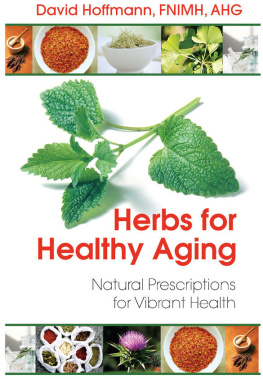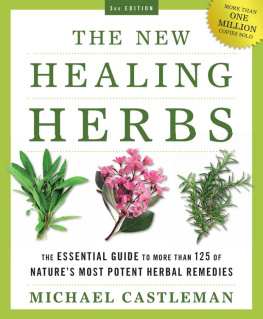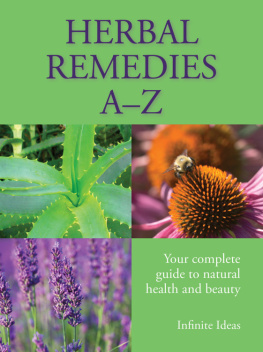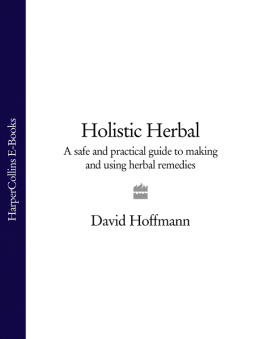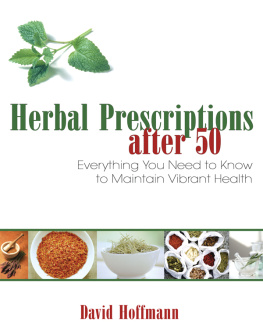
Herbs for Healthy Aging

Medical statistics clearly show that Americans are the most heavily medicated people in the world. In spite of this (or possibly because of this) we rank far below many other first world countries in life expectancy and far above in cancer rates, levels of obesity, and many other chronic degenerative diseases.
As our population ages many more people are realizing that in order to stay healthy into old age we need to become proactive, improving our diets and lifestyle choices, reducing stress, and becoming more knowledgeable about our health and medicine. One way we can help to prevent disease and enhance wellness is the intelligent use of herbs.
Because few Americans grew up using plants as medicine, educating oneself as to their safe and rational use is essential. With so many books, websites, and magazines publishing information on herbs and natural health, how does one discern accurate information from the fraudulent? One answer is David Hoffmanns new book, Herbs for Healthy Aging.
Hoffmann is one of the Western worlds most respected clinical herbalists, and he offers the reader safe, effective, and relevant treatments for many of the ills that come with increasing age. If you want to prevent senior moments, menopausal symptoms, prostatic enlargement, and circulatory problems, some of the answers you are seeking can be found within these pages.
DAVID WINSTON, RH(AHG), AUTHOR OF ADAPTOGENS:
HERBS FOR STRENGTH, STAMINA, AND STRESS RELIEF
Herbal medicine can be as simple as brewing a pot of tea. However, knowing which herbs to use and how to use them requires experience, which Hoffmann amply provides. Herbs for Healthy Aging gives authoritative answers to most of the commonly asked questions about when and how to use herbs medicinally.
NATURAL HEALTH
For Dolores and Chris from their brother,
who will never grow up and get a real job!

Oh, well, a touch of grey
Kind of suits you anyway.
ROBERT HUNTER AND JERRY GARCIA

My deepest thanks go to all the people who made this possible, but especially to Alan for stopping me on Main Street and seeding the idea in the first place; to Joel, Cherie, and Dylan for being such soul friends; and to Barry and Sue for so much support and help.
This country has yet to truly discover the profound wisdom and humanity of its herbalists that, through some divine blessing, I have encountered! Bless you all. For help and insights that are embedded in my ramblings like gems in mud, special thanks to Rob McCaleb, Brigitte Mars, Kathi Keville, Jim Green, Jeannie Rose, Rosemary Gladstar, David Winston, Christopher Hobbs, Roy Upton, Mary Moss, Michael Tierra, and Autumn Summers.
Remember that none of this would have been possible without the Photosynthesis Angels.
CONTENTS
Foreword
READ THIS TIMELY and delightful book for a comprehensive look at herbal health and take away a deepened understanding of a natural approach to more healthful aging. You will also get an appreciation for the personal power that results from an integrated relationship with the growing things of the earth. As an internist and geriatrician, I have been and am profoundly moved by the failures of preventive health care and the resulting helplessness of our aging population to manage their own symptoms. Though I began practicing in both hospital and outpatient settings in 1978, it was only after ten years of practice that I began to recognize the helpful role of phytotherapeutics in preventing, supporting, and toning aging metabolic systems. And it was another five years after that before I more directly experienced the remarkable help provided by herbal preparations (used in a complementary role) in acute or severe chronic conditions. David Hoffmanns encyclopedic knowledge and enthusiastic passion for his subject have provided much of the database supporting my observations of this realm of medical information.
Hoffmanns chapter on the nervous system is of particular interest to a generation frequently living in fear of decreasing mental abilities, although only a minority will actually develop the pathological dementias of aging (Alzheimers disease, multi-infarct dementia). Despite the demographic realities, many people suffer from fear of diminished capacities or will be profoundly affected by anxiety, loss of role in the family, situational depression, or loneliness. Hoffmann recognizes the importance of control in the management of anxiety and stress, and he offers useful, self-controlled strategies for the development of adaptive responses to changing life situations, without falling into the traps of overgeneralization or oversimplification.
The chapter on herbal medicine making should appeal to all the frustrated chemists and cooks among us. The satisfaction that comes from preparing ones own concoctions, tinctures, ointments, and topicals is immense. Medicine making connects me with many earlier generations of wise herbalists, and I can, however briefly, assume that mantle of earthly healing knowledge. The independence engendered and the love transmitted by the gift of homemade medicine is no minor aspect of the path.
Herbal, holistic approaches also offer the family a chance to rediscover its herbal heritage and to begin building family lore and support for disorders and difficulties faced by all. Whenever the healing process can be a cooperative activity of an empowered, informed family, the potential for growth and increased richness of relationship may emerge along with recovery.
I invite you into this world of green, growing friends with enthusiasm. May you acquire many new helpers in the plant world and begin to feel a part of the garden into which you were born.
CHERI QUINCY, D.O.
INTERNAL MEDICINE AND GERIATRICS
SANTA ROSA MEDICAL GROUP
SANTA ROSA, CALIFORNIA
Introduction
YOU HAVE BEFORE YOU A GUIDE to using herbal medicines in addressing the health care needs of people older than age fifty. It emphasizes practical information that can be taken by anyone who wishes to use safe and effective herbs to promote wellness, prevent illness, and treat disease when necessary. It is not meant to replace professional medical help, and as a practical herbal, it makes no claim to be a comprehensive medical guide stuffed with references and citations. The focus is the potential herbal contribution to ensuring a healthy aging process.
WHY NOW?
The Relevance of Herbal Medicine
It works! This comes as a surprise to many people after years of being conditioned by the medical and pharmaceutical establishment to the idea that life was hell before the advent of steroids and antibiotics. Of course, there are limits to what herbalism can do, but within these limits herbalism is very effective.
It can be used in conjunction with other modalities. There is no need to choose between therapies, as with very few exceptions, medicinal plants can be part of any treatment plan.
It is environmentally clean. Green issues and environmental awareness are finally becoming part of our cultures worldview, and more people recognize that green medicine is healthy for the individual and for the environment.
It possesses viriditas. This Latin term (literally, the greening power) was coined by the medieval abbess and herbalist Hildegard of Bingen to describe the profoundly spiritual aspect of herbal remedies. The use of herbs allows us to experience the embrace of nature and, through it, the miraculous touch of the divine.
Next page
